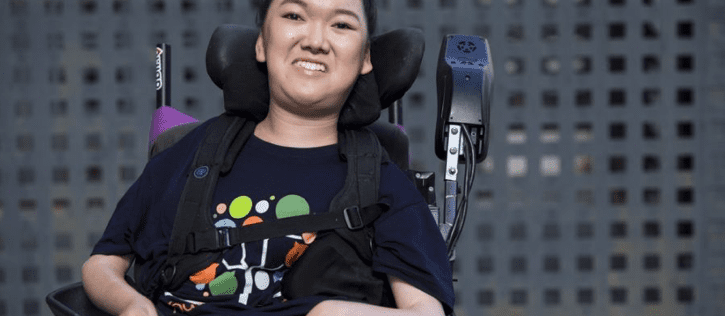Melanie Tran is a UX designer, disruptor, innovator, activist and entrepreneur. She is the chair of the National Youth Disability Summit Co-Design Committee, and the co-founder of AbilityMate, a company which uses 3D printing to create custom-made orthoses.
Charlotte Lim is an alumna of the University of Sydney and one of the 2020 Disability Officebearers.
As a UX designer with more than eight years of experience under her belt linking health, design and technology and business together, Tran is no stranger to leveraging what it means to be an Asian-Australian woman with disability – with its labels, hangups and baggage, but also with its intimately situated knowledge – as a catalyst for social change.
“The beauty of writing lies upon the fact that boundaries and opportunities are only limited by one’s imagination and creativity,” she tells me. “And it’s also the fact that storytelling is a powerful tool that can be used to help challenge our perspectives and allows us to see the world through the eyes of others.”
What initially drew me to Tran was our likeness. I wanted to understand how she had grappled with the multiplicity of living as a woman of colour who has a disability. “When I first started to… understand what it means to be a woman with a disability, I struggled to figure out whether my disability overpowers my identity as a woman. I would spend a lot of time wondering what people see when they look at me – do they see a woman? Or do they see a person in a wheelchair?”
But the conflict between these identity categories doesn’t phase Tran anymore. “I don’t have the answer to this. But more importantly, I’ve learnt that this doesn’t matter. Because regardless, it doesn’t detract from the fact that I have something different to offer.”
I am curious about how she feels about the everyday aspects – and therefore challenges – of working in a male-dominated industry. “As a woman with a disability… I often get asked how I feel about this or what are some of the challenges. I’d challenge this perspective and ask: what do we have to lose if more women worked in this sector? It would mean that we are placed in a better position to address gender equality. It would mean we are able to create better products and services because it is created by people with diverse backgrounds and unique perspectives.”
Tran is a big believer in celebrating difference. I ask her what she wishes people knew about being a person living with a disability: “You could either see [disability] as a barrier and restriction, or you could see it as a driving force for innovation and catalyst for social change.”
“Being a woman with a disability comes with challenges, but at the same time, it has also forced me to think creatively and helped shape my perspective as a designer. That is exactly what makes each and every one of us unique. And this is precisely the toughest challenge [of being a woman of colour with a disability] – it’s about understanding our unique perspectives and how we can leverage this to help us shape a more diverse and inclusive society.”
I am interested in Tran’s beliefs on tackling tokenism. I assumed that Tran, like many others in the disabled community, did not want to be thought of as just the “disabled designer” or “disabled speaker”. Tran answers with an unexpected vigour: “I think the first step is to take a step back and think about what the term access and inclusion means to you. Everyone has a different definition, but what does it mean to you? What does it look like in practice? Why do you care?”
I don’t have an answer.
“Some would see access and inclusion as a matter of compliance and checking the boxes so that they can continue getting the job done.” Tran continues. “Others would see regulations as a starting point, and the principles of access and inclusion can only truly be embraced when they go beyond compliance. When they understand that access and inclusion is a journey that enables them to learn, fail and improve.”
According to Tran, curiosity and fearlessness are the two prongs that forge the foundations of social change. “Curiosity leads to questions. Questions lead to understanding. And understanding leads to empathy. Having the ability to empathize would allow you to understand how unique perspectives can contribute to our society and drive the change we need to see.”
She offers me a challenge: “think about your perspective on this. And more importantly, what you can do in your everyday work, to go beyond compliance.”





